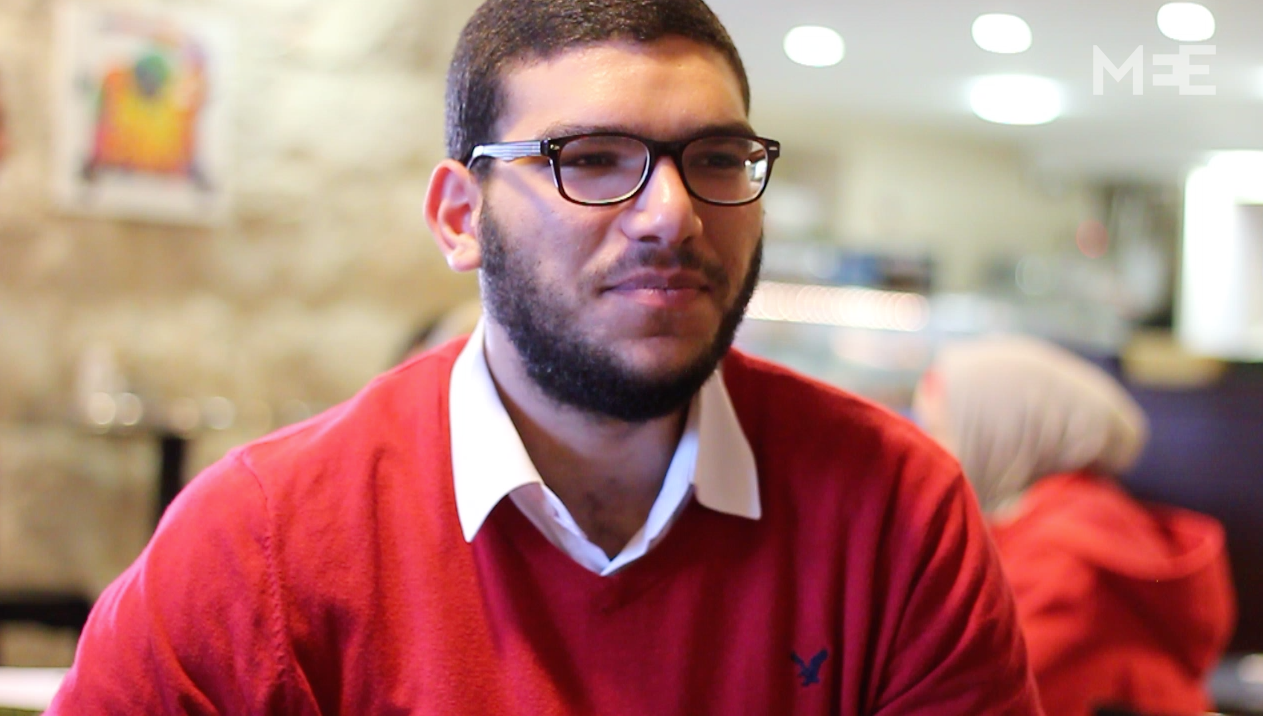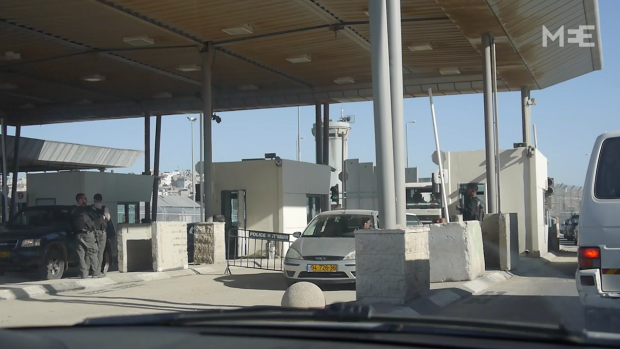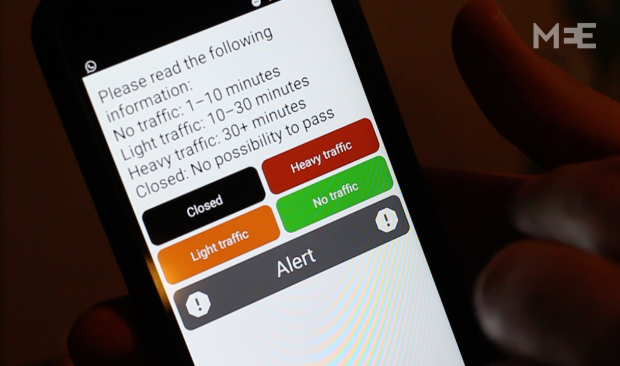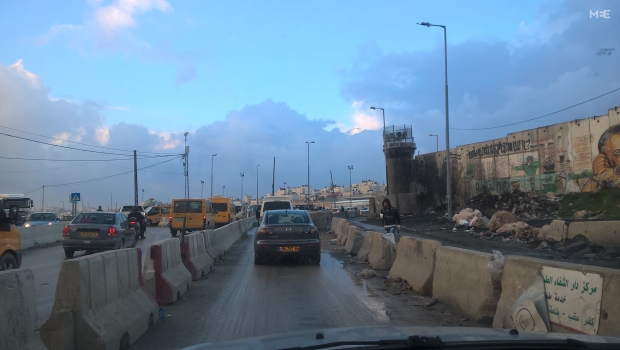The occupation? We have an app for that

EAST JERUSALEM - Travelling by road, the distance from Jerusalem to Ramallah is just over 20km; approximately the distance you would travel between Croydon and Soho in central London, or almost the exact length of Manhattan in New York.
In other words, it is not far at all – especially not by car.
However, when asking locals in Jerusalem the time it would take to drive or take public transport to the economic hub of the West Bank, you are likely to receive wide-ranging guesses: “Maybe thirty minutes, maybe two hours?”
The reason for this baffling uncertainty is largely due to Qalandia, a labyrinth of iron fences that funnel commuters through a series of turnstiles, past X-ray machines and gates to an inspection booth, all the while monitored by a dense network of security cameras.
Qalandia is one of hundreds of military checkpoints staffed by Israeli security personnel that controls access from East Jerusalem to the West Bank. All traffic must pass through these bottleneck checkpoints that restrict free movement and inevitably cause significant traffic jams and huge delays.
However, a new smartphone app – Azmeh - has been developed in order to combat this very problem and has been widely welcomed by those who use it to make their unpredictable daily commutes a little more manageable.
An innovative tool
Twenty-year-old Basel Sader, the founder and developer of Azmeh – which means "traffic jam" in Arabic – spoke to MEE about how he came to first conceptualise the app.
“I’ve thought of many ways of combating many of our problems here,” he said, “but unfortunately I’m not quite in the position to do much – I’m only a law student. I saw this particular problem though and thought, this I can do something about.”
The student from occupied East Jerusalem said that he has always encountered problems with the checkpoints, ever since childhood, and has to pass through them on an almost daily basis to travel across the border from Israel to the occupied Palestinian territory.
“My cousins live in Ramallah, my aunt and uncle live in Bethlehem, I play basketball in the Palestinian league, so most of our games are either in Ramallah or Bethlehem. Palestinians are just like everyone else, and the same way that everyone else wants to be able to travel through their country freely, we want to travel freely in our country too,” Sader said of the frustration of the restrictions of movement for Palestinians.
“So the idea of the app came from the occupation itself really. The checkpoints are cumbersome and tiring, and one of the ideas behind the app was to help Palestinians know if there is traffic or not.”
With a computer scientist for a father, it seems that a knack for technology runs in the family. Sader discovered his passion for the field when attending summer camps when he was younger. In the camps he was introduced to the world of coding and first began to learn about mobile development.
“Lately I have been more interested in smartphone apps and how they can be useful to us. Azmeh was my first app on the IOS platform for iPhones and it was my third for Android.”
“I must say the first two apps I made were not as successful… but you always have to fail before you can succeed I guess; the third one is a charm!” he laughed.
'11,000 downloads so far'
Sader explained how the design is based on a simple colour coding system; green signifies no traffic, orange means there is light traffic, red means heavy and black means the checkpoint is closed.
The app is based around an interactive interface, allowing the user to share the status, vote on whether updates are accurate or not, post alerts and add comments – perhaps detailing if there are clashes nearby, or a road accident – and users are even able to message people through Whatsapp, Facebook or MSN.
“After the first version, many of my family members helped me to improve it,” Sader said. “A lot of the additional features you see weren’t actually my ideas. My cousin suggested some things, my sisters helped with the design; many users would also get in touch with me directly too suggesting areas they felt the app was lacking. When it was a good suggestion I replied and said ‘thanks – we’re going to do that’ and we'd integrate it into the app.”
As he opened the app, Sader detailed how the software and design features are continually improving and organically evolving.
“The first version only featured two checkpoints – now on this version there are approximately 47 checkpoints," he explained as he rapidly flicked through menu options. “The first version was only in Arabic, but now you can download it in English. The first only had ‘No traffic’ or ‘traffic,’ whereas now we have a spectrum of colours.”
“The app is improving every day and hopefully it will keep evolving, maybe into something bigger. I'm always thinking about taking this project to another level, I’m not sure what that other level is just yet, but I’m sure there are other ways to develop and expand this. It started here in Palestine, but there isn’t any reason why this app couldn’t be exported to other countries too.”
When asked about future plans and whether there any other apps in the works, Sader grinned and confessed he was currently working on another project, but was not allowed to divulge its contents at this stage in time.
Counter cartographies
By harnessing technology to combat some of the negative effects of Israel’s occupation and helping Palestinians cope with the burdensome checkpoint system, Sader’s app is being viewed by some as a tool of resistance. In a way, he is putting into practice the popular slogan of Palestinian resistance which you so often see spray painted onto crumbling walls or printed onto t-shirt slogans worn across the West Bank: "To exist is to resist".
This is a view shared by Eyal Weizman, an Israeli professor and architect who authored Hollow Land – an exploration into the political space created by Israel’s occupation.
“Open source software like Azmeh designed by Sader are part of what Edward Said called ‘counter cartographies’ - the use of the technologies and tools of the dominants for the task of resistance,” Weizman told MEE.
“They [developers such as Sader] are inverting the gaze of technologies against the dominant.”
Weizman has long-studied the checkpoint system and explained that “the security rationale for the checkpoint system is founded on the belief that the less Palestinians are permitted to circulate through space, the more secure this space will be”.
“The checkpoint system has become so omnipresent and intrusive that it has grown to govern the entire spectrum of Palestinian life under occupation... The checkpoints not only carve up space, but divide up time as well.”
A useless endeavour?
It is this time-draining consequence of the checkpoints which Sader is primarily attempting to counter through Azmeh, although he admits that his app does not cut into the heart of the problem.
Mohammed Abu Shah, a Palestinian student from Hebrew University in Jerusalem, commended the app for aiding his regular commutes across checkpoints, but expressed his concern at the deeper affects the checkpoints are having upon Palestinian society.
“The app is great, but it was created because of the checkpoints which exist in our country,” he said. “The occupation purposefully separates us [Palestinians] instead of gathering us. When I go to Ramallah or Bethlehem from East Jerusalem it takes such a long time.
“The checkpoints make us Palestinians two separate people with two separate mindsets,” he added, referring to Palestinians within the occupied territories, and Palestinians who live within Israel’s borders.
“I’ve heard from people that it is a great app and really helps. I’ve heard from others that it is a good initiative but it is fairly useless, as it doesn’t actually solve the problem,” Sader acknowledged.
“And they have a point - the checkpoints are still here, the occupation is still here, so nothing much has changed.” It's just an aid to help get through the day.
“It’s unfortunate, but that's the world we live in right now,” he sighed. “I’m not sure there is much else I can do right now, but hopefully in the future something will change.”
Azmeh is available to download for free via iTunes or Google Play.
New MEE newsletter: Jerusalem Dispatch
Sign up to get the latest insights and analysis on Israel-Palestine, alongside Turkey Unpacked and other MEE newsletters
Middle East Eye delivers independent and unrivalled coverage and analysis of the Middle East, North Africa and beyond. To learn more about republishing this content and the associated fees, please fill out this form. More about MEE can be found here.




